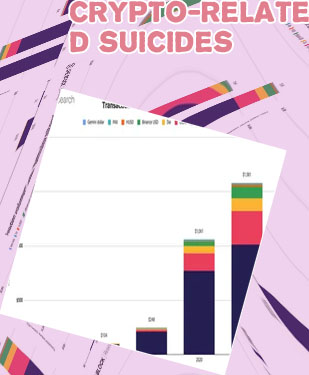
As the cryptocurrency market continues to grow, centralized exchanges are seeing over a trillion dollars in trading volume annually. This trend is impacting the overall landscape of the crypto industry, leading to a focus on scalability, security, and regulations. To navigate this evolving space, here are four articles that provide insights, analysis, and solutions for dealing with centralized crypto trading over a trillion dollars a year:
The Rise of Centralized Exchanges: Challenges and Opportunities

Centralized exchanges have become a cornerstone of the cryptocurrency industry, offering users a convenient platform to trade various digital assets. These exchanges act as intermediaries between buyers and sellers, facilitating liquidity and providing a secure environment for trading. However, with their rise in popularity, centralized exchanges have also faced a number of challenges.
One of the main challenges faced by centralized exchanges is the issue of security. Over the years, several high-profile hacks have resulted in the loss of millions of dollars worth of cryptocurrencies. This has raised concerns among users about the safety of their funds stored on these platforms. Despite efforts to enhance security measures, centralized exchanges continue to be targeted by hackers due to their centralized nature.
Moreover, regulatory uncertainty has also posed a challenge for centralized exchanges. Governments around the world are still grappling with how to regulate the cryptocurrency market, leading to a lack of clarity for exchange operators. This uncertainty can hinder the growth of centralized exchanges and create barriers to entry for new players in the market.
Despite these challenges, centralized exchanges also present a variety of opportunities for users. By providing a user-friendly interface and offering various trading pairs, centralized exchanges have made it easier for both beginners and experienced traders to participate in the cryptocurrency market. Additionally, centralized exchanges play a crucial role in price discovery and market liquidity,
Securing Trillion-Dollar Transactions: A Deep Dive Into Crypto Exchange Security
As the world of cryptocurrency continues to expand, the security of exchanges becomes increasingly vital. To address this critical issue, the article "Securing Trillion-Dollar Transactions: A Deep Dive Into Crypto Exchange Security" provides a comprehensive exploration of the measures taken by exchanges to protect large-scale transactions.
The article delves into the sophisticated security protocols employed by crypto exchanges to safeguard trillion-dollar transactions from potential threats. By analyzing the encryption methods, multi-factor authentication processes, and cold storage solutions utilized by exchanges, readers gain valuable insights into the intricate mechanisms that underpin the security of the crypto market.
Furthermore, the article sheds light on the ongoing challenges faced by exchanges in maintaining the integrity of their platforms amidst a rapidly evolving landscape of cyber threats. From phishing attacks to malware infiltration, the risks associated with cryptocurrency transactions are manifold and require continuous vigilance to mitigate.
In conclusion, "Securing Trillion-Dollar Transactions: A Deep Dive Into Crypto Exchange Security" offers a detailed examination of the security measures implemented by exchanges to protect high-value transactions. This article is essential reading for anyone interested in understanding the complex interplay between security and cryptocurrency transactions in the digital age.
Regulatory Approaches to Centralized Crypto Trading: A Global Comparison
The regulation of centralized crypto trading platforms varies significantly across the globe, with each jurisdiction taking a unique approach to overseeing these platforms. In the World, there is an increasing recognition of the need to balance innovation and consumer protection in the crypto trading space.
-
Licensing requirements: Some countries require centralized crypto trading platforms to obtain a license from financial regulators before operating, while others do not have specific licensing requirements in place. This can impact the level of investor protection available to users of these platforms.
-
Customer verification: Many jurisdictions have implemented customer verification requirements for centralized crypto trading platforms to prevent money laundering and terrorist financing. These requirements vary in stringency, with some countries mandating extensive KYC (Know Your Customer) procedures.
-
Market surveillance: Regulators in some countries have established market surveillance mechanisms to monitor trading activities on centralized crypto platforms. This helps to detect suspicious trading patterns and market manipulation, safeguarding the integrity of the crypto market.
-
Asset listing standards: Different jurisdictions have diverse standards for listing new crypto assets on centralized trading platforms. Some regulators impose strict criteria to ensure the quality and legitimacy of listed assets, while others adopt a more lenient approach.
-
Enforcement actions: In cases of non-compliance with regulatory requirements,
Scalability Solutions for High-Volume Crypto Trading Platforms
In the fast-paced world of cryptocurrency trading, scalability is a crucial factor for high-volume trading platforms looking to stay ahead of the curve. As the popularity of cryptocurrencies like Bitcoin and Ethereum continues to grow, so too does the need for platforms that can handle large trading volumes without sacrificing speed or reliability.
One solution that has gained popularity in recent years is the use of off-chain trading protocols. These protocols allow for faster transaction processing by moving transactions off the main blockchain and onto a separate network. By reducing the number of transactions that are processed on the main blockchain, off-chain protocols can significantly increase the scalability of a trading platform.
Another key component of scalability solutions for high-volume crypto trading platforms is the use of sharding. Sharding involves breaking up the blockchain into smaller, more manageable pieces, or "shards," which can be processed independently. By distributing the workload across multiple shards, platforms can significantly increase their transaction processing speeds and overall scalability.
Some notable figures in the world of cryptocurrency trading, such as Vitalik Buterin of Ethereum fame, have been vocal supporters of scalability solutions like off-chain protocols and sharding. These technologies have the potential to revolutionize the way that high-volume trading platforms operate, paving the way for even greater adoption of cryptocurrencies in the future.
